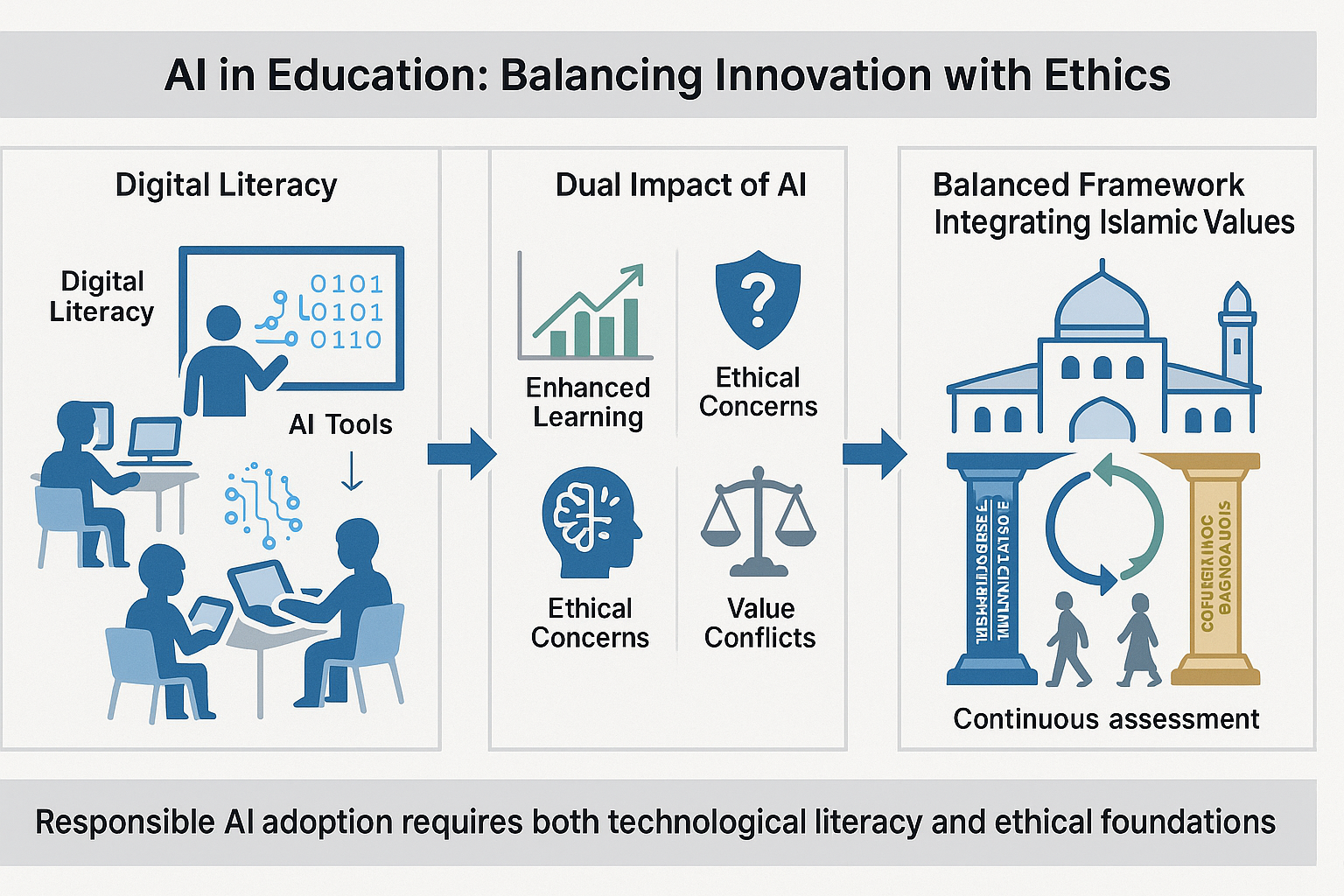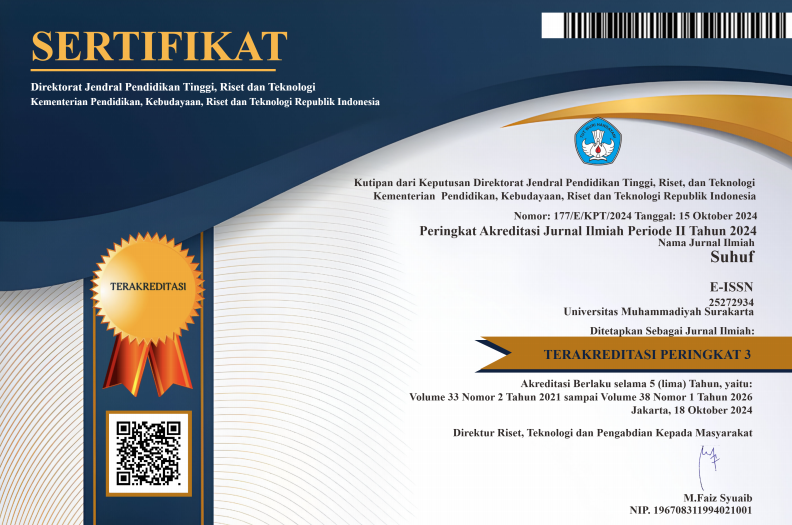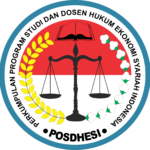Artificial Intelligence (AI): An Opportunity and Challenge for Achieving Success in Islamic Education in the Era of Digital Transformation
DOI:
https://doi.org/10.23917/suhuf.v36i2.6273Keywords:
Artificial intelligence , Islamic education , Transformation digitalization , Educational innovation , Learning qualityAbstract
Artificial Intelligence (AI) has become an integral part of digital literacy systems and plays a vital role in the development of intelligence. In the educational sector, AI represents a significant innovation that can greatly enhance the quality of learning and educational management. This technology offers numerous benefits, supporting educational stability and improving the teaching and learning processes. However, it is crucial to acknowledge that AI can also lead to adverse effects if misused. Therefore, ensuring the responsible use of AI in education is essential, adhering to applicable ethical standards. Educational institutions, particularly those with Islamic values, must continually innovate in response to technological advancements. At the same time, they should equip their students with strong religious values to mitigate potential harm that may arise from these technological developments. By fostering a balanced approach, educational institutions can leverage AI’s potential while safeguarding their students' moral and ethical foundations.
Downloads
References
Rif'ah, "Pendidikan dan Sains dalam Pandangan Islam [Education and Science from an Islamic Perspective]," Pros. Konf. Integr. Interkoneksi Islam dan Sains, vol. 2, pp. 347–352, (in Indonesia), 2020, [Online]. Available: https://sunankalijaga.org/prosiding/index.php/kiiis/article/view/422
Z. Baidhawy, "Muhammadiyah dan Spirit Islam Berkemajuan dalam Sinaran Etos Alqur'an [Muhammadiyah and the Spirit of Progressive Islam in the Light of the Quranic Ethos]," Afkaruna Indones. Interdiscip. J. Islam. Stud., vol. 13, no. 1, pp. 17–47, (in Indonesia), 2017, doi: https://doi.org/10.18196/afkaruna.v13i1.4202.
A. Khoirudin, Z. Baidhawy, and M. R. M. Nor, "Exploring Muhammadiyah's Historical Civilizational Dimension of Social Reconstruction in Indonesia: Humanitarian and Cosmopolitan Approaches," J. Al-Tamaddun, vol. 15, no. 1, pp. 183–197, 2020, doi: https://doi.org/10.22452/JAT.vol15no1.13.
M. A. F. Santoso and Y. Khisbiyah, "Islam-based Peace Education: Values, Program, Reflection, and Implication," Indones. J. Islam Muslim Soc., vol. 11, no. 1, pp. 185–207, 2021, doi: https://doi.org/10.18326/ijims.v11i1.185-207.
M. M. Miftahul Munir, Ahmad Syar'i, "Tantangan dan Peluang Pendidikan Islam di Tengah Arus Perkembangan Teknologi Digital," in Proceedings of Palangka Raya International and National Conference on Islamic Studies (PINCIS), 2021. [Online]. Available: https://scholar.google.com/citations?view_op=view_citation&hl=en&user=2oGDYbkAAAAJ&citation_for_view=2oGDYbkAAAAJ:eQOLeE2rZwMC
Z. Qodir, H. Jubba, M. Hidayati, I. Abdullah, and A. S. Long, "A Progressive Islamic Movement and its Response to the Issues of the Ummah," Indones. J. Islam Muslim Soc., vol. 10, no. 2, pp. 323–352, 2020, doi: https://doi.org/10.18326/ijims.v10i2.323-352.
C. Mahfud, A. Khairunisa, A. Prasetyo, E. Bayu, and M. Alfreda, "Urgensi Membangun Paradigma Qur'ani Mahasiswa Institut Teknologi Sepuluh Nopember Di Era Digital [The Urgency of Building a Quranic Paradigm for Students of the Sepuluh Nopember Institute of Technology in the Digital Era]," Al-Tadzkiyyah J. Pendidik. Islam, vol. 12, no. 1, pp. 157–170, (in Indonesia), 2021, doi: https://dx.doi.org/10.24042/atjpi.v12i1.8625.
A. B. Shiddiq, "The Application of ‘Nemo' Artificial Intelligence in Arabic Language Learning in the 4.0 Revolution Era at Al-Khalifah Islamic Boarding School Cibubur," IJLECR - Int. J. Lang. Educ. Cult. Rev., vol. 6, no. 1, pp. 58–61, 2020, doi: http://dx.doi.org/10.21009/IJLECR.061.07.
A. Aditoni and Z. Rohmah, "Campus-Based Millennials' Learning Preferences Toward Dawah in the Urban City of Surabaya," J. Indones. Islam, vol. 16, no. 1, pp. 27–48, 2022, doi: http://dx.doi.org/10.15642/JIIS.2022.16.1.27-48.
A. Zamhari, "Defending Islamic Tradition Theological Responses of the Hadrami Majlis Taklim Groups toward the Salafi-Wahabi Preaching Movement in Contemporary Indonesia," J. Indones. Islam, vol. 16, no. 1, pp. 75–102, 2022, doi: https://doi.org/10.15642/JIIS.2022.16.1.75-102.
J. Tupan, I. Y. Lattu, and W. M. Therik, "Spiritual Intelligence as the Politics of Multiculturalism Among Javanese Muslim Migrants in Maluku," J. Indones. Islam, vol. 16, no. 1, pp. 1–26, 2022, doi: https://doi.org/10.15642/JIIS.2022.16.1.1-26.
M. Thohir, S. Maarif, J. Rosyid, H. Huda, and A. Ahmadi, "From Disruption to Mobilization: Ire Teachers' Perspectives on Independent Learning Policy," Cakrawala Pendidik., vol. 40, no. 2, pp. 359–373, 2021, doi: https://doi.org/10.21831/cp.v40i2.39540.
M. L. Arqam, E. T. Somae, A. M. Atmojo, and T. K. Akbar, "Peningkatan Kapasitas Inovasi Pembelajaran Ismuba Masa Pandemi Covid-19 Melalui Aplikasi Nearpod di SMK Muhammadiyah 1 Bambanglipuro [Increasing the Capacity for Learning Innovation in Ismuba During the Covid-19 Pandemic Through the Nearpod Application at," in Prosiding Seminar Nasional Hasil Pengabdian Kepada Masyarakat Universitas Ahmad Dahlan, 2021, p. (in Indonesia). [Online]. Available: https://seminar.uad.ac.id/index.php/senimas/article/view/7452/pdf
S. Sugiyono, Metode Penelitian Pendidikan Pendekatan Kualitatif, Kuantitatif dan R & D. Bandung: Alfabeta, 2018.
W. Darmalaksana, "Metode Penelitian Kualitatif Studi Pustaka dan Studi Lapangan," Pre-Print Digit. Libr. UIN Sunan Gunung Djati Bandung, pp. 1–6, 2020, [Online]. Available: http://digilib.uinsgd.ac.id/id/eprint/32855
Novianti E, Fatkhia Alda Rizka, and Nuryana Zalik, "Analisis Kebijakan Pembelajaran PAI di Masa Pandemi: Peluang dan Tantangan [Analysis of PAI Learning Policies During the Pandemic: Opportunities and Challenges]," J. Pendidik. Islam, vol. 11, no. 2, pp. 201–211, (in Indonesia), 2020, doi: https://doi.org/10.22236/jpi.v11i2.5663.
Suyadi, "Pendidikan Islam Anak Usia Dini dalam Perspektif Neurosains: Robotik Akademik dan Saintifik [Early Childhood Islamic Education from a Neuroscience Perspective: Academic and Scientific Robotics]," Edukasia J. Penelit. Pendidik. Islam, vol. 13, no. 2, pp. 231-261. (in Indonesia), 2019, doi: http://dx.doi.org/10.21043/edukasia.v13i2.3255.
N. D. S. M. Ghazali and A. F. Saad, "Online Student Performance System Integrating Multidimensional Data Visualization and Chatbot for Primary School," Int. J. Artif. Intell., vol. 9, no. 2, pp. 63–73, 2022, doi: https://doi.org/10.36079/lamintang.ijai-0902.457.
A. Khoirunisa, F. Rohman, H. A. Azizah, D. Ardianti, A. L. Maghfiroh, and A. M. Noor, "Islam in the Midst of AI (Artificial Intelligence) Struggles: Between Opportunities and Threats," Suhuf Int. J. Islam. Stud., vol. 35, no. 1, pp. 45–52, 2023, doi: httphttps://doi.org/10.23917/suhuf.v35i1.22365s://doi.org/10.23917/suhuf.v35i1.22365.
I. W. S. Putra, Sukarmi, and F. Sulistio, "Arrangements of Artificial Intelligence in Criminal Law in Indonesia," Int. J. Multicult. Multireligious Underst., vol. 9, no. 1, pp. 296–303, 2022, doi: http://dx.doi.org/10.18415/ijmmu.v9i1.3389.
H. Sidabutar and H. P. Munthe, "Artificial Intelligence dan Implikasinya Terhadap Tujuan Pembelajaran Pendidikan Agama Kristen [Artificial Intelligence and Its Implications for the Learning Objectives of Christian Religious Education]," JMPK J. Manaj. Pendidik. Kristen, vol. 2, no. 2, pp. 76–90, (in Inndonesia), 2022, doi: https://doi.org/10.51667/jmpk.v2i2.1078.
L. Hakim, "Peranan Kecerdasan Buatan (Artificial Intelligence) dalam Pendidikan," Kemdikbud. [Online]. Available: https://ppg.kemdikbud.go.id/news/peranan-kecerdasan-buatan-artificial-intelligence-dalam-pendidikan
L. P. A. S. Tjahyanti, P. S. Saputra, and M. Santo Gitakarma, "Peran Artificial Intelligence (AI) untuk Mendukung Pembelajaran di Masa Pandemi Covid-19 [The Role of Artificial Intelligence (AI) in Supporting Learning During the Covid-19 Pandemic]," Komteks, vol. 1, no. 1, pp. 15–21, (in Indonesia), 2022, [Online]. Available: https://ejournal.unipas.ac.id/index.php/Komteks/article/view/1062
S. L. Zahara, Z. U. Azkia, and M. M. Chusni, "Implementasi Teknologi Artificial Intelligence (AI) dalam Bidang Pendidikan [The Implementation of Artificial Intelligence (AI) Technology in the Field of Education]," J. Penelit. Sains dan Pendidik., vol. 3, no. 1, pp. 15–20, (in Indonesia), 2023, doi: http://dx.doi.org/10.23971/jpsp.v3i1.4022.
N. Khairuni, "Dampak Positif dan Negatif Sosial Media Terhadap Pendidikan Akhlak Anak (Studi Kasus di SMP Negeri 2 Kelas VIII Banda Aceh) [The Positive and Negative Impacts of Social Media on Children's Moral Education: A Case Study at SMP Negeri 2 Banda Aceh, Eighth G," J. EDUKASI J. Bimbing. Konseling, vol. 2, no. 1, pp. 91–106, (in Indonesia), 2016, doi: http://dx.doi.org/10.22373/je.v2i1.693.
F. Mulianingsih, K. Anwar, F. A. Shintasiwi, and A. J. Rahma, "Artificial Intellegence dengan Pembentukan Nilai dan Karakter di Bidang Pendidikan [Artificial Intelligence with the Formation of Values and Character in the Field of Education]," Ijtimaiya J. Soc. Sci. Teach., vol. 4, no. 2, pp. 148–154, (in Indonesia), 2020, doi: http://dx.doi.org/10.21043/ji.v4i2.8625.
I. G. Ratnaya, "Dampak Negatif Perkembangan Teknologi Informatika dan Komunikasi dan Cara Antisipasinya [The Negative Impact of Information and Communication Technology Development and How to Anticipate It]," J. Pendidik. Teknol. dan Kejuru., vol. 8, no. 1, pp. 17–28, (in Indonesia), 2011, doi: https://doi.org/10.23887/jptk-undiksha.v8i1.2890.
S. Khodijah and Y. Nurizzati, "Dampak Penggunaan Teknologi Informasi dan Informasi Terhadap Perilaku Sosial Siswa di MAN 2 Kuningan [The Impact of Information and Communication Technology Use on the Social Behavior of Students at MAN 2 Kuningan]," J. Edueksos, vol. 7, no. 2, pp. 161–176, (in Indonesia), 2018, doi: http://dx.doi.org/10.24235/edueksos.v7i2.3370.
M. Jailani and S. Suyadi, "The Impact of Neuroscience-Based Modern Islamic Education on the Aspect of Creative Imagination and Development of Religious Moderation on Madura Island," Islam Transform. J. Islam. Stud., vol. 6, no. 2, pp. 157–172, 2022, doi: https://doi.org/10.30983/it.v6i2.5793.
N. Aflisia, N. A. Eq, and A. Suhartini, "The Urgency of Theological Foundations in Islamic Education in the Industry Era 4.0 towards the Society Era 5.0," Int. J. Educ. Res. Dev., vol. 1, no. 1, pp. 60–77, 2021, doi: https://doi.org/10.52760/ijerd.v1i1.4.
U. Hasanah and M. Sukri, "Implementasi Literasi Digital dalam Pendidikan Islam: Tantangan dan Solusi [The Implementation of Digital Literacy in Islamic Education: Challenges and Solutions]," Equilib. J. Pendidik., vol. 11, no. 2, pp. 177–188, (in Indonesia), 2023, doi: https://doi.org/10.26618/equilibrium.v11i2.10426.
S. Lestari, "Peran Teknologi dalam Pendidikan di Era Globalisasi [The Role of Technology in Education in the Era of Globalization]," EDURELIGIA J. Pendidik. Agama Islam, vol. 2, no. 2, pp. 94–100, (in Indonesia), 2018, doi: https://plu.mx/plum/a/?doi=10.33650/edureligia.v2i2.459.
H. F. Zarkasyi, "Liberalisasi Pemikiran Islam: Gerakan Bersama Missionaris, Orientalis dan Kolonialis [The Liberalization of Islamic Thought: A Joint Movement of Missionaries, Orientalists, and Colonialists]," Tsaqafah, vol. 5, no. 1, pp. 1–28, (in Indonesia), 2009, doi: https://doi.org/10.21111/tsaqafah.v5i1.145.
N. Nuryadin, "Strategi Pendidikan Islam Di Era Digital [Islamic Education Strategies in the Digital Era]," FITRAH J. Kaji. Ilmu-Ilmu Keislam., vol. 3, no. 1, pp. 209–226, (in Indonesia), 2017, doi: http://dx.doi.org/10.24952/fitrah.v3i1.637.
N. Latifah, "Pendidikan Islam di Era Globalisasi [Islamic Education in the Era of Globalization]," JIE (Journal Islam. Educ., vol. 2, no. 1, pp. 74–88, (in Indonesia), 2017, [Online]. Available: https://ejournal.stitmuhbangil.ac.id/index.php/jie/article/view/45
Magister Ilmu Hukum, "Dampak Negatif dari Teknologi Artificial Intelligence (AI)," Universitas Medan Area. [Online]. Available: https://mh.uma.ac.id/dampak-negatif-dari-teknologi-artificial-intelligence-ai/
Rif'ah and U. H. Islamiyah, "Islamic Education Responds To the Challenges of Globalization," Islam Universalia - Int. J. Islam. Stud. Soc. Sci., vol. 4, no. 1, pp. 29–47, 2022, doi: http://dx.doi.org/10.56613/islam-universalia.v4i1.211.
C. Yu, "Chinese Adult English Learners'(AELs) Learning Obstacles: Examination from Neurolinguistic, Psychosocial, and Sociolinguistic Perspectives," University of Colorado at Denver, 2020. [Online]. Available: https://www.proquest.com/openview/d1620de2ef6c550c2ad1ea0b696df9b9/1?pq-origsite=gscholar&cbl=18750&diss=y
M. Jailani, Suyadi, and Djamaluddin Perawironegoro, "Arabic Language Teaching With the Concept of the Ta ' Limul Mutaallim Kitab To Improve Intelligence To Read the Yellow Kitab," Int. Conf. Islam Educ. "Moderate Islam. Educ. Sustain. Dev. Plur. Soc., vol. 2, no. 1, pp. 87–97, 2022, [Online]. Available: https://proceeding.uingusdur.ac.id/index.php/iconie/article/view/726
R. A. Aziz, Y. Fitriyanti, D. Darnoto, and F. Rohman, "Tantangan Pendidikan Karakter Islami Di Era Teknologi Artificial Intelligence [Challenges of Islamic Character Education in the Era of Artificial Intelligence Technology]," Tarbawi J. Pendidik. Islam, vol. 20, no. 1, pp. 47–61, (in Indonesia), 2023, doi: https://doi.org/10.34001/tarbawi.v19i2.5431.
S. Saihu, "Konsep Pembaharuan Pendidikan Islam Menurut Fazlurrahman [The Concept of Islamic Educational Reform According to Fazlurrahman]," Andragogi J. Pendidik. Islam dan Manaj. Pendidik. Islam, vol. 2, no. 1, pp. 82–95, (in Indonesia), 2020, doi: https://doi.org/10.36671/andragogi.v2i1.76.
M. Jailani, S. Suyadi, and M. Muallimah, "Pengembangan Pembelajaran Alquran Hadis dengan Pendekatan Akal Bertingkat Ibnu Sina Di SMK Muhammadiyah 3 Yogyakarta Berbasis Neurosains: Di Masa Pandemi Covid-19 [Development of Quran and Hadith Learning with Ibn Sina's Staged Reasoning Approach at SMK M," SALAM J. Sos. dan Budaya Syar-i, vol. 8, no. 4, pp. 1051–1066, (in Indonesia), 2021, doi: https://doi.org/10.15408/sjsbs.v8i4.18995.
M. Jailani and S. Suyadi, "The Relevance of K.H. Ahmad Dahlan's Tajdid Thoughts on Islamic Education During the Covid-19 Pandemic," J. Educ. J. Educ. Stud., vol. 6, no. 2, p. 111, 2022, doi: https://doi.org/10.30983/educative.v6i2.5176.
B. Biyanto, "The Typology of Muhammadiyah Sufism: Tracing Its Figures' Thoughts and Exemplary Lives," Indones. J. Islam Muslim Soc., vol. 7, no. 2, pp. 221–249, 2017, [Online]. Available: http://ijims.iainsalatiga.ac.id/index.php/ijims/article/view/1292
F. I. Fauzy and A. N. Jannah, "Islamic on Screen: Religious Narrative on Indonesia's Television," Stud. Islam., vol. 28, no. 2, pp. 473–481, 2021, doi: https://doi.org/10.36712/sdi.v28i2.22205.
S. Suyadi and S. Sutrisno, "A Genealogycal Study of Islamic Education Science at the Faculty of Ilmu Tarbiyah dan Keguruan UIN Sunan Kalijaga," Al-Jami'ah J. Islam. Stud., vol. 56, no. 1, pp. 29–58, 2018, doi: https://doi.org/10.14421/ajis.2018.561.29-58.
M. Suyadi, "Millennialization of Islamic Education Based on Neuroscience in the Third Generation University in Yogyakarta Indonesia," QIJIS (Qudus Int. J. Islam. Stud., vol. 7, no. 1, pp. 173–201, 2018, doi: http://dx.doi.org/10.21043/qijis.v7i1.4922.
A. Nusi, "Post-traditionalist Nahdlatul Ulama and Neo-modernist Muhammadiyah: A Study of Local Muslim Thoughts in Gorontalo," Int. J. Soc. Sci. Hum. Res., vol. 5, no. 5, pp. 1743–1750, 2022, doi: https://doi.org/10.47191/ijsshr/v5-i5-24.
M. Jailani, "Meneguhkan Inovasi Pendidikan dalam Diskursus Al-Qur'an: Kebermanfaatannya di Sekolah-Madrasah di Indonesia [Strengthening Educational Innovation in the Discourse of the Quran: Its Benefits in Schools and Madrasahs in Indonesia]," Tanzil J. Stud. Al-Quran, vol. 5, no. 2, pp. 151–170, (in Indonesia), 2023, doi: https://doi.org/10.20871/tjsq.v5i2.252.
N. Chanifah, Y. Hanafi, C. Mahfud, and A. Samsudin, "Designing a Spirituality-Based Islamic Education Framework for Young Muslim Generations: A Case Study from Two Indonesian Universities," High. Educ. Pedagog., vol. 6, no. 1, pp. 195–211, 2021, doi: https://doi.org/10.1080/23752696.2021.1960879.
T. Hamami and Z. Nuryana, "A Holistic-Integrative Approach of the Muhammadiyah Education System in Indonesia," HTS Teol. Stud. Stud., vol. 78, no. 4, pp. 1–10, 2022, [Online]. Available: https://www.ajol.info/index.php/hts/article/view/248310
A. Baidowi, A. Salehudin, A. Mustaqim, S. Z. Qudsy, and N. Hak, "Erratum: Theology of Health of Quranic Pesantren in the Time of COVID-19," HTS Teol. Stud. Stud., vol. 77, no. 4, pp. 1–12, 2021, [Online]. Available: https://www.ajol.info/index.php/hts/article/view/232905

Downloads
Submitted
Accepted
Published
How to Cite
Issue
Section
License
Copyright (c) 2024 Rifah Rifah, Mohammad Jailani, Miftachul Huda

This work is licensed under a Creative Commons Attribution 4.0 International License.


















